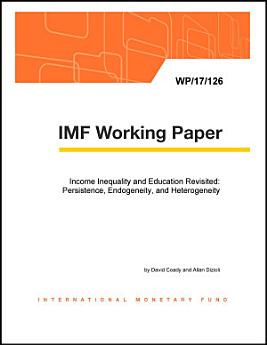Income Inequality and Education Revisited: Persistence, Endogeneity, and Heterogeneity
মে’ ২০১৭ · International Monetary Fund
ইবুক
23
পৃষ্ঠা
reportমূল্যাংকন আৰু পৰ্যালোচনা সত্যাপন কৰা হোৱা নাই অধিক জানক
এই ইবুকখনৰ বিষয়ে
This paper presents new results on the relationship between education expansion and income inequality. While human capital theory suggests that income inequality increases with inequality of education outcomes, the expected relationship between income inequality and the level of education is ambiguous. Consistent with these theoretical priors, when dynamic panel estimation techniques are used to address issues of persistence and endogeneity we find a large, positive, statistically significant and stable relationship between education inequality and income inequality, especially in emerging and developing economies and among older age cohorts. The relationship between income inequality and education levels is positive but small and not always statistically significant, but we find a statistically significant negative relationship with schooling levels of younger cohorts. Statistical tests indicate that our dynamic estimators are consistent and that our identifying instruments are valid. Policy simulations suggest that education expansion will continue to be inequality reducing but that this role will diminish as countries develop.
এই ইবুকখনক মূল্যাংকন কৰক
আমাক আপোনাৰ মতামত জনাওক।
পঢ়াৰ নির্দেশাৱলী
স্মাৰ্টফ’ন আৰু টেবলেট
Android আৰু iPad/iPhoneৰ বাবে Google Play Books এপটো ইনষ্টল কৰক। ই স্বয়ংক্রিয়ভাৱে আপোনাৰ একাউণ্টৰ সৈতে ছিংক হয় আৰু আপুনি য'তে নাথাকক ত'তেই কোনো অডিঅ'বুক অনলাইন বা অফলাইনত শুনিবলৈ সুবিধা দিয়ে।
লেপটপ আৰু কম্পিউটাৰ
আপুনি কম্পিউটাৰৰ ৱেব ব্রাউজাৰ ব্যৱহাৰ কৰি Google Playত কিনা অডিঅ'বুকসমূহ শুনিব পাৰে।
ই-ৰীডাৰ আৰু অন্য ডিভাইচ
Kobo eReadersৰ দৰে ই-চিয়াঁহীৰ ডিভাইচসমূহত পঢ়িবলৈ, আপুনি এটা ফাইল ডাউনল’ড কৰি সেইটো আপোনাৰ ডিভাইচলৈ স্থানান্তৰণ কৰিব লাগিব। সমৰ্থিত ই-ৰিডাৰলৈ ফাইলটো কেনেকৈ স্থানান্তৰ কৰিব জানিবলৈ সহায় কেন্দ্ৰত থকা সবিশেষ নিৰ্দেশাৱলী চাওক।






